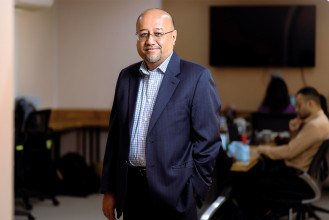
“We have the human resources to build a scalable back office hub. We should look into our niche market advantage. This is the South Asian century and there are waves of opportunities in Nepal that we must explore and capitalise.”
Founded by Sulochana Shrestha Shah and Dr. Rishi Keshab Bikram Shah in 1998, Lotus Holdings is a family business that is active in real estate, hand made rugs, healthcare, and information technology. Today, the business is being run and managed by the second generation Ajit Bikram Shah, who has taken the company to the next level, focusing the investments and services more on IT and outsourcing. His companies currently outsource across small to multi-billion dollar Fortune 50 companies around the world and are also involved in various technology projects with the Government of Nepal, a particular example is successfully helping the government collect over USD 170 million revenue annually, a 20 fold increase since pre-digitisation.
Shah holds a Bachelor’s degree from the University of Minnesota in Chemistry and is currently obtaining an Executive Education from the Harvard Business School through the Young Presidents’ Organisation (YPO) program where Shah is the South Asia Regional Board Member.
With a career spanning close to two decades, Shah is recognised for his sharp focus in growth strategy, business development and customer acquisition. He has worked in diverse and often challenging international environments to deliver high impact results while maintaining operational excellence.
In his latest venture, Shah has big plans to establish a platform where he could scale Nepal up to become the back office of the world. He envisions that by 2030 Nepal will have an alternative source of foreign currency earnings at par to the current inflow of remittances while creating 1.5 million jobs.
In this edition of Business 360, Ajit Shah shares his thoughts and plans for business post pandemic. Excerpts:




We definitely need a robust infrastructure for effective service delivery in every sector. We can maximise the opportunities through the use of IT. The revolution of IT has proven to connect each and everyone around the globe. Remote service delivery has made us feel that there are no borders.
The Covid 19 pandemic has exposed the need for robust IT infrastructures for effective service delivery from the government and the private sector. Your thoughts.
We definitely need a robust infrastructure for effective service delivery in every sector. We can maximise the opportunities through the use of IT. The revolution of IT has proven to connect each and everyone around the globe. Remote service delivery has made us feel that there are no borders. Without having to physically travel to all of my offices, I am able to connect with my staff, partners and customers worldwide through digital platforms. The Covid 19 pandemic has further escalated the importance of these platforms for uninterrupted service delivery during difficult times. On the understanding that the government has other priorities especially during this difficult time, I believe that increased attention should also be paid to our country’s IT infrastructures as this has the potential to quickly catapult growth. It is necessary that we equip technology solutions and developed systems to provide more robust services. One of our companies have developed technology solutions to help advance the government’s services; for example, a system to manage vehicle information throughout the country such as vehicle registration, ownership transfer, renewal, and tax collection. We already have the infrastructure to link this with the other stakeholders for better utilisation of the costs; it’s just a matter of enabling this feature. Again, it is simply a matter of prioritisation.You have some experience of executing government projects. How would you characterise the working style of the government?
Having a government as your customer is very different compared to private companies. Ultimately, what we are trying to do is to lend our expertise to strengthen performance for public services, but it is true that there are hurdles in introducing any new system and make people habitual irrespective of the efficacy of the service delivery. In our vehicle registration project, the software we designed and implemented has proved to increase the efficiency and brought effectiveness in their operations. The government has seen significant growth in its revenue streams after adapting to the system. We saw that the government is highly committed to transformation, but it is bound by different circumstances. While abiding by all the legal procedures, it is not easy for government entities to make swift decisions like private companies. Too much red tape has become an unnecessary hassle and a hindrance to innovation. Take the procurement process for instance, bidding where every government entity has to select the lowest bidder that complies with all technical specifications has made it almost impossible for high quality work to be selected.How are you taking your businesses forward during this pandemic?
After the enforcement of the nationwide lockdown in March 2020, I thought about how we can address the forthcoming challenges in Nepal with the help of technology. Nepal has an outstanding talent pool that is being underpaid and underutilised in the local market. For example, an entry-level accountant in Singapore costs approximately SGD 3000 per month while the same skill in Nepal costs only a fraction of that. Now if there was a way of connecting this with companies around the world who are exploring ways to save costs, I think we have a business model that works. Nepal will indeed have the potential to be the back office to the rest of the world.How can Nepal draw on its potential to be the back office of companies across the globe? What can make it happen?
Approximately nine years ago, we partnered in a outsourcing venture where we work with retailers around the world helping their trading, finance and technology teams. Today we have grown to a size of over 300+ people in Nepal and currently work with Fortune 50 companies across USA, Europe, Asia, Australia and the Middle East. The average age of our employees is 24 and the majority of them are women. Connecting people, identifying the customer’s pain points and coming up with solutions is a must to take forward such businesses. Strategy is always important for the success of every business. Despite knowing the opportunity and idea of execution, it would be difficult to take a business to newer heights without strategy. In a bid to grow this industry, we have to reach out to business owners around the world to outsource services from Nepal to narrow down the staffing costs of their companies. I am envisioning such services to be initially catered to creative, entertainment, medical, pharmaceutical and education industries before expanding to others.
Covid 19 has forced businesses to adapt to technology as there isn’t a chance of survival without it. Though this may have started as a rude awakening for many businesses, once the adoption is done there are a plethora of opportunities that open up and the pandemic has pushed consumers to behave in favour of the companies who are now newly ready.
How can Nepal capitalise its demographic dividend in establishing the country as a back office hub?
Out of the 30 million population, 50% are below the age of 50. Narrowing it down further, you have 30% below 24 years. Every year we see approximately 80,000 fresh college graduates entering the job market with a growing number each year. Yet, it is difficult to provide at least 1.5 million jobs as we are sorely lacking the infrastructure. By transforming Nepal to become the back office of the rest of the world through technologies, it could generate over 1.5 million jobs in the next 10 years. We have the human resources to build a scalable back office hub. We should look into our niche market advantage. This is the South Asian century and there are waves of opportunities in Nepal that we must explore and capitalise. This industry will grow at par of annual remittance earnings at nearly USD 8 billion per annum. If we could bring outsourcing related works with an average salary of USD 300 per individual, we will need about three million jobs to be at par with remittances. Obviously, that cannot happen in one year. If we can strategise on this plan for the next 5-10 years, this industry will diversify the source of foreign currencies rather than be over-reliant on remittances.The pandemic has defined that post Covid 19, IT will play a big role in the future of most global business continuity plans. Do you visualise businesses in Nepal adapting or converting more seriously to remote working and digitisation?
When lockdowns started in March 2020, all our 300+ employees immediately switched to our work from home business continuity plan, and we are fortunate to have a great team that implemented this flawlessly. This wasn’t a choice, but a must for survival. Just like the rest of the world, I do see companies in Nepal following this pattern, as the pandemic has truly changed the way we do business. It is important for business leaders to think about the change in the environment and really focus on its advantages. The pandemic may have forced physical boundaries around the world - but it has taken away digital boundaries and made the world so much smaller. For example, if you are a business owner in New York and you need an accountant that can work from home - why can this person not be a Nepali accountant working from home in Nepal?How do you evaluate the disruption from traditionally run business to integrating IT across most platforms in doing business for Nepal considering that we are either ultra urban or completely rural and in-between?
As of January 2020, it has been reported that active internet users of Nepal is six million, growing at 20% annually. I think it is important to look at the question of rural vs. urban differently - not in the merits of their physical infrastructure development but in the merits of their connectivity to the internet. The internet is the infrastructure that can make Nepal extremely competitive with the rest of the world. I feel if all stakeholders can constantly work on expanding the reach of the internet to the entire population - it substantially increases the probability of growth to happen. Additionally, the cost of expanding the internet infrastructure can happen at a fraction of the cost of expanding the physical infrastructure.Digital classrooms, telemedicine, online shopping are all suggesting a major shift in how businesses will function in the near future, does this also mean that more people will be left out of jobs in the process of automation and AI if they do not learn or adapt fast enough? What are some of the real threats or opportunities in this for our human resources?
As long as the cost of Nepal’s human resources are lower than the cost in developed countries, I don’t foresee an issue for existing Nepali workers, and as time progresses it will be clear as to what skills will be required and the education system will at parallel catching up to create human resources in Nepal that can compete with anyone and anywhere in the world.How can companies’ right size their manpower without aggressive laying off staff yet maintaining recovery?
Change is inevitable and the only constant in life. Companies have the moral responsibility to retrain their employees. I understand that this won’t be possible for the entire business community, as some industries have been hit more severely than the others. It is also important for human resources to learn new skills, as it is all easily accessible for free on the internet.From the onset of Covid 19, we saw certain businesses established as full functioning e-commerce business entities within weeks and months, what does this tell us about customer behaviour and expectations? Should we be more selective about modernising our technology capabilities?
Covid 19 has forced businesses to adapt to technology as there isn’t a chance of survival without it. Though this may have started as a rude awakening for many businesses, once the adoption is done there are a plethora of opportunities that open up and the pandemic has pushed consumers to behave in favour of the companies who are now newly ready. As a business leader, we should constantly be asking how we can pivot to this new trend which I believe is here to stay. It is reported that some existing e-commerce retailers have already witnessed a four times business growth between pre and post Covid 19.
We all only have 24 hours in a day, and having a finite amount of time to live is the biggest challenge that I have as an entrepreneur. It has taught me to value time, and really focus on the things that matter to me.
There are diseconomies of scale for businesses based on technology to survive in current Nepal. Your thoughts.
I believe that Nepal is still in its infancy when it comes to technology based businesses but the pandemic will be seen as a force of good in the adoption of this. Basic infrastructure such as internet access, payment gateways and delivery logistics are slowly being created and as this increases, I am confident that we will start to see more businesses moving into such direction.How do you perceive the use of data analytics in the country?
The mammoth technology companies in the world like Apple, Amazon, Google and Facebook are valued based on the data they own and monetise. Data analytics is the future of technology as it can be used for profit making, social impact and governance. All decisions big or small have to be data-driven. This kind of decision-making makes it possible to come up with very specific solutions to the challenges. Data analytics is only as good as the volume of data that can be analysed, and the first step is to really digitalise anything as much as possible so that this data can be used to help in decision making in the future.What has been your biggest challenge as an entrepreneur? What did it teach you?
We all only have 24 hours in a day, and having a finite amount of time to live is the biggest challenge that I have as an entrepreneur. It has taught me to value time, and really focus on the things that matter to me. In terms of doing what I want to do - I am always thinking about what resources I currently have that could make the most impact. This thought process helps me clearly choose my endeavors.What is the best business advice you have ever received?
Daily rituals that make us consistent in what we do are the best business advice that I have received. Start from wherever you are. Don’t wait for situations to change to your favour. It’s the little steps you take every single day consistently as daily rituals and the aim of the game is to keep doing things that increase the probability that lead to success.How can businesses address the challenge of scaling up?
Scalability is possible when the bottleneck issues like infrastructure are addressed. You cannot have your business plan depend on what other people will do for you.What is your business mantra and what gives meaning to the work you do?
Constantly asking how I can get there faster is the business mantra I follow. There is no guarantee that the decisions we take are correct all the time, but if there is a ritual that constantly asks this question in every step - it is the best decision that you can take at that time. I believe that we have borrowed the world from our future, and that it is our responsibility to make sure we return it better than how it was when we got it. This gives meaning to the work I do.How do you define success?
If the outcome is achieved by the work you put in and is measurable - that’s success. Success doesn’t always have to be big goals; it can be achievements of the many small targets that ultimately make it one big goal.What are some of your interests besides work?
Constant exploration of life, places, people and experiences is something that I am always very interested to do besides work. This gives me a chance to constantly learn by witnessing new things. I am also always interested in giving back by being involved in various for-profit and non-profits boards, social work or mentoring people around the world who would benefit out of my experience.
Published Date: October 13, 2020, 12:00 am
Post Comments
E-Magazine
RELATED In the Lead




-1757917838.jpg)